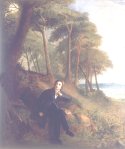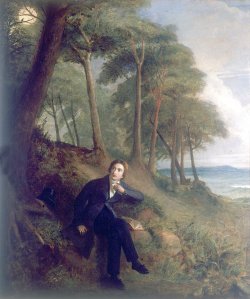Stephen King said you can learn a lot from bad writing. John Keats was a great writer, but he wasn’t perfect. I say that because he said it, “Had I been nervous about its[Endymion] being a perfect piece, … it would not have been written.” Endymion was criticized for having an idea end on the first line of a pair of rhyming lines, and then a second idea start on the second line of a rhyming pair.
Following is an example where an Endymion sentence ends on the first rhyming line(“breathing”), and a new sentence is started on the second rhyming line(“wreathing”).
... a sleep Full of sweet dreams, and health, and quiet breathing. Therefore, on every morrow, are we wreathing ...
The above happens too often in Endymion, and much less (rarely) in Keats’s later poem, Lamia. Following are 2 good example Lamia rhyming pair lines that are continuous within the punctuation: “;” and “.”.
For somewhere in that sacred island dwelt A nymph, to whom all hoofed Satyrs knelt; At whose white feet the languid Tritons poured Pearls, while on land they wither'd and adored.
Keats was cool about criticism. He listened, he learned, he improved.
The following may not be perfect, however it is a perfectly wonderful poetic piece from Endymion.
... Not of these days, but long ago ’twas told By a cavern wind unto a forest old; And then the forest told it in a dream To a sleeping lake, whose cool and level gleam A poet caught as he was journeying To Phoebus’ shrine; and in it he did fling His weary limbs, bathing an hour’s space, And after, straight in that inspired place He sang the story up into the air, Giving it universal freedom. There ...

